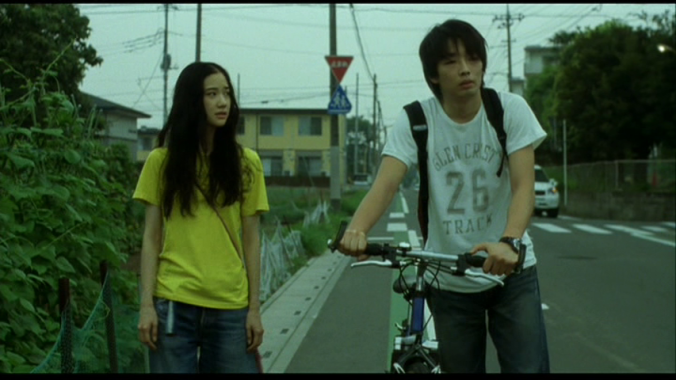 No matter where you go, there you are. This is certainly the problem faced by Suzuko, the Million Yen Girl of the title. Quiet, shy, unassuming, she keeps finding herself in situations that might draw her out of her shell and then withdrawing into it and running away again.
No matter where you go, there you are. This is certainly the problem faced by Suzuko, the Million Yen Girl of the title. Quiet, shy, unassuming, she keeps finding herself in situations that might draw her out of her shell and then withdrawing into it and running away again.
This cycle begins when another waitress at her restaurant job in Tokyo asks her to share an apartment. Only after the lease has been signed is she told that the other girl has a boyfriend who will also move in. Before she is settled, the couple break up, the boy throws out a kitten she is trying to rescue, and she in turn throws out his stuff. He claims there was a million yen in one of the bags, and she refuses to take the out offered to her by the police* and ends up with a fine she can’t pay, which means a brief prison sentence.
As we have seen elsewhere, nothing can mess up the reputation of a person and of their family members like a criminal record, and here this applies to even the most minimal of records. Employers for the part time jobs she finds don’t ever ask, so she finds work, such as a call center, and lives at home, until her little brother demands that she leave. He is getting bullied at school, though he doesn’t tell her or his family. She has no particular desire for money itself; perhaps because of the figure mentioned at her trial and certainly because of the large deposits and fees required by Japanese landlords, she decides she needs a million yen to go where no one knows her. At each new place, she immediately starts saving up her pay until another million yen will allow her to move on.
She works at a food stall on the beach, where she attracts the attention of a handsome regular. Then she goes to a mountain village where she settles in as a boarder at a peach orchard. From there, it is on to another city where she finds work in the garden section of a Home Depot-like store. She finds herself falling in love with the student in her department, and he seems to do so with her, with the revelation of her secret not affecting his feelings in any way. Yet, eventually she runs away from him as well, in a very enigmatic ending.
It is hard to be sure that her little brother is being bullied only because of her record. As both the smallest and the smartest boy in the 6th grade class, he would be a prime target for school bullies almost anywhere. But her history certainly does not help. One of the many ironies of the film is that he interprets her actions as great bravery; this inspires him eventually to fight back and he refuses the chance to go where no one knows him at a private middle school for which he has passed the exams and stay at the public middle school where he will still have to cope with his old bullies. At all times, he refuses to tell anyone about the bullying, keeping it his secret.
The family has held in its own secrets for some time. When the brother tells Suzuko she should leave over dinner, Father gets up to answer the phone in the middle of the meal and, before we know it, Mother is accusing him of keeping a girl on the side and he is charging her with picking up young men at the train stations for sex.
Suzuko’s brief spell picking peaches visits another theme that has been common in Japanese movies of this era, the disappearance of the village. There are no young people left, except for a couple of elementary school kids, and the local mayor jumps at the chance to use her as the “Peach Girl” face of some publicity to help sell the crops and to tell a national audience that young people still still have a place here. She of course refuses, eventually forced to tell the villagers that she has a criminal record.
The fan subs on my copy translate nigamushi as bitter beetle, which is close but still doesn’t quite fit Suzuko. She is a shy young woman, even before her prison sentence, but in the shape of Yu Aoi is certainly not ugly or particularly bitter. If she is angry about her life, she keeps it inside, never lashing out or even striking back. She has built a shell around herself long before her crime, and no matter the opportunities given to her, refuses to come out of that shell. As soon as she finds a job at her new place, she starts preparing to leave. She says she wants to go where no one knows her, and as the movie progresses, that takes on a double meaning – while she may think she is just trying to escape her “criminal” past, she doesn’t use the opportunity of each new place to start a “new life.” She really wants to find a place where no one will even try to penetrate her shell.
 That shell at last seems to be cracked by Nakajima, the young man she works with in the garden center. Their romance starts hesitantly and shyly on both parts and slowly blossoms in the gentlest and most sincere manner possible. Then another young woman joins them at work. She is also a student at Nakajima’s university and they get on very well as he teaches her the job. Out of the blue, one night in bed he asks Suzuko for a loan, and soon she is paying for their movies, their lunches, and even tea for him and the other woman. Their romance had been so gentle and sincere, it is hard to believe that he is really only after her savings, and another possible motive eventually surfaces. But that still leaves Suzuko on the stairs to the train station platform and a most enigmatic conclusion.
That shell at last seems to be cracked by Nakajima, the young man she works with in the garden center. Their romance starts hesitantly and shyly on both parts and slowly blossoms in the gentlest and most sincere manner possible. Then another young woman joins them at work. She is also a student at Nakajima’s university and they get on very well as he teaches her the job. Out of the blue, one night in bed he asks Suzuko for a loan, and soon she is paying for their movies, their lunches, and even tea for him and the other woman. Their romance had been so gentle and sincere, it is hard to believe that he is really only after her savings, and another possible motive eventually surfaces. But that still leaves Suzuko on the stairs to the train station platform and a most enigmatic conclusion.
Written and directed by Yuki Tanada, another of the women to at last find a regular place behind the camera in the early century, the movie constantly toys with audience expectations. Suzuko is offered not isolation and urban despair when she leaves home but three shots at paradise – the beach, the fruitful village in the country, and eventually true love and romantic fulfillment with not one but two chances at a happy ending. Each time, however, she is not thrown out of paradise. Suzuko is the one who chooses to leave, perpetually running not from her past but from life itself.
* The detective questioning her says that if she claims to have “done it” with the roommate, it would be treated as a civil dispute between a couple and of no interest to the police, but she refuses to say that, which makes it theft of property, which in turn is a crime.

